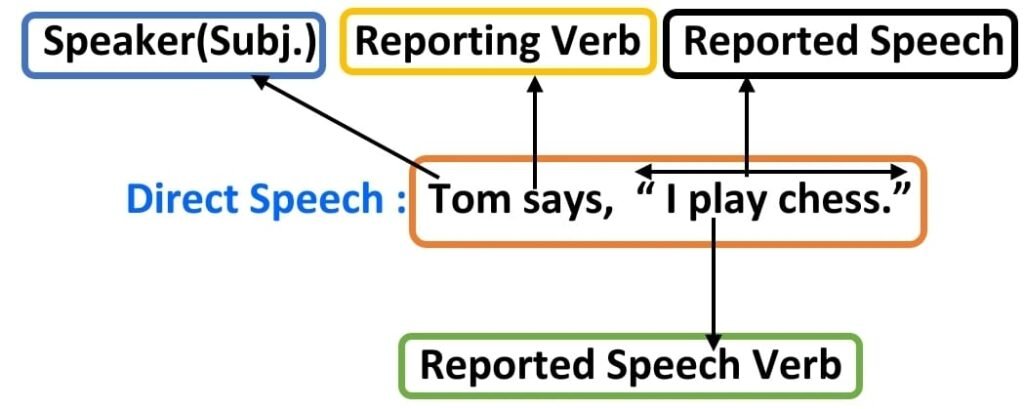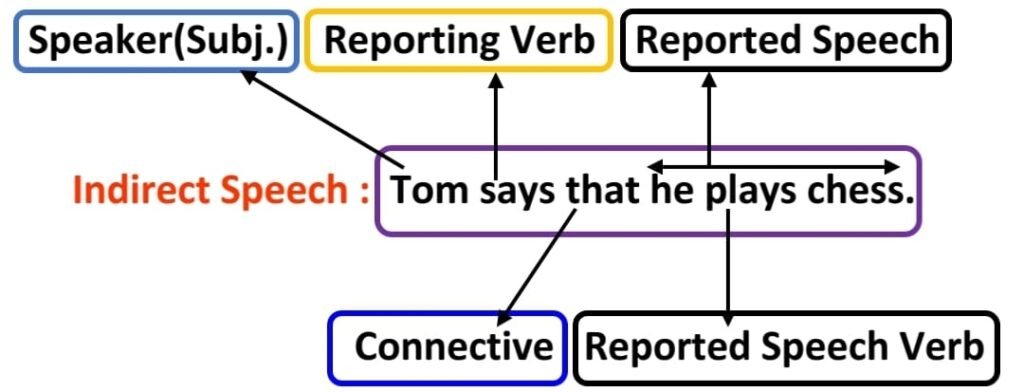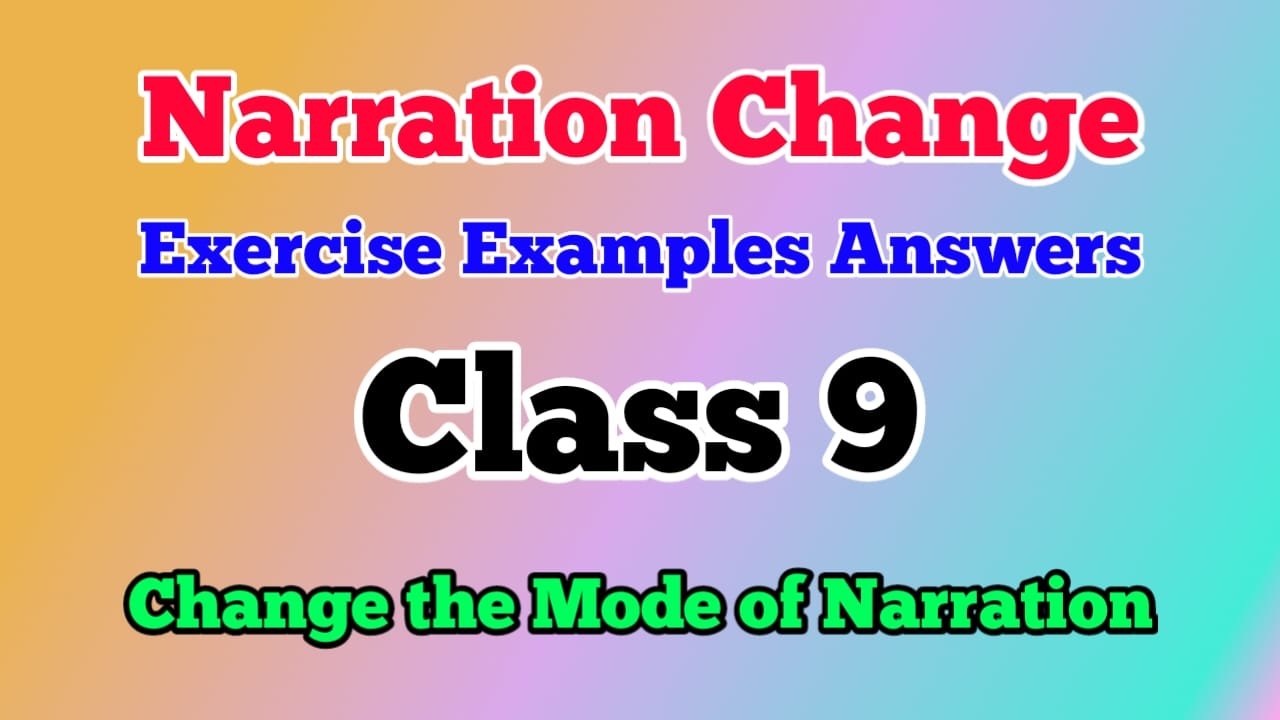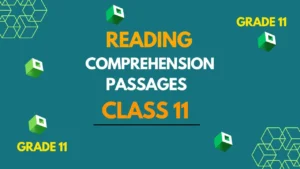Enhance the concept of narration change with our guide, ‘Narration Change Class 9 Examples Rules and Exercises.‘ This guide simplifies concepts like rules to change first-person, second-person, third-person, and tense changes, supported by practical examples, exercises, and answers to solidify your understanding.”
Reporting someone’s words directly or indirectly is known as Narration. Narration in English grammar is about how a story or speech is shared, either by repeating the exact words (direct speech) or by summarizing them (indirect speech).
For Example,
| Direct Speech | Indirect Speech |
| Tom says, “I play Chess.” | Tom says that he plays chess. |
The process of transforming speech from direct to indirect or from indirect to direct is called Narration change. Narration Change class 9 Examples Rules and Exercises are explained in the following with exercises and answers.
Class 9 Narration Change
When we quote the exact words of the speaker, it is called Direct Speech or Direct Narration. Study the following pictograph for a better understanding.

Here Tom’s speech is quoted in the actual words used by him. The speech which is quoted in actual words (“I play chess.” called the Reported Speech and the verb (“says“) that introduces speech is called the Reporting Verb.
When someone reports the speaker’s words indirectly without changing the meaning, it is called Indirect Speech or Indirect Narration. Here Tom’s speech is reported in the form of Narration and shown in the below pictograph.

People also ask
| Narration Change Class 5 | Narration Change Class 8 |
| Narration Change Class 6 | Narration Change Class 9 |
| Narration Change Class 7 | Narration Change Class 10 |
Class 9 Narration Change Examples in General
Narration Change class 9 Examples have been prepared with Examples and Answers in the following. After each Example, an Exercise has been given. Study the Change of narration of the following sentences carefully.
Direct Speech: He said, “I am writing a letter.”
Indirect Speech: He said that he was writing a letter.
Direct Speech: She says, “ You are an intelligent girl.”
Indirect Speech: She says that I am an intelligent girl.
Direct Speech: He said to me, “My father is reading a newspaper.”
Indirect Speech: He told me that his father was reading a newspaper.
Direct Speech: He will say to her, “I am reciting a poem.”
Indirect Speech: He will tell her that he is reciting a poem.
Direct Speech: He said to you, “ I did it carefully.”
Indirect Speech: He told you that he had done it carefully.
In the indirect speech ‘told' may be used for 'said to'. But ‘told' does not take 'to' after it and ‘told' takes an object.
Examples of Different Tenses of Narration Change Class 9
Study the following Examples of change of Tense in the sentences from Direct to Indirect Speech.
Direct: You say, ‘I am always busy.’
Indirect: You say that you are always busy.
Direct: The child will say, ‘Mum knows everything.’
Indirect: The child will say that Mum knows everything.
Direct: He said, ‘I need some money.’
Indirect: He said that he needed some money,
Direct: She said, ‘I am waiting for him.’
Indirect: She said that she was waiting for him.
Direct: The boy said, ‘I have done my homework.’
Indirect: The boy said that he had done his homework.
Direct: You said, ‘The baby has been sleeping.
Indirect: You said that the baby had been sleeping.
Direct: He said, ‘I did it.’
Indirect: He said that he had done it.
Direct: She said, ‘He was talking.‘
Indirect: She said that he had been talking.
Direct: The monk said, ‘Man will die.’
Indirect: The monk said that man will die.
Direct: He said, ‘The sun gives us light.’
Indirect: He said that the sun gives us light.
Rules of Tense for Narration Change Class 9
| Reporting Verb | Reported Speech Verb in Direct Speech | Reported Speech Verb in Indirect Speech |
| Present Tense He says, | Present Tense “ I eat rice” | Present Tense He says that he eats rice. |
| Present Tense He says, | Past Tense “ I ate rice” | Past Tense He says that he ate rice. |
| Present Tense He says, | Future Tense “I shall eat rice” | Future Tense He says that he will eat rice. |
| Future Tense He will say, | Present Tense “I eat rice” | Present Tense He will say that he eats rice. |
| Future Tense He will say, | Past Tense “I ate rice” | Past Tense He will say that he ate rice. |
| Future Tense He will say, | Future Tense “I shall eat rice” | Future Tense He will say that he will eat rice. |
| Past Tense He said, | Present Indefinite “I eat rice” | Past Indefinite He said that he ate rice. |
| Past Tense He said, | Universal truth or regular habit “The earth moves round the sun.” | Remains unchanged He said that the earth moves round the sun. |
| Past Tense He said, | Present Continuous “I am eating rice.” | Past Continuous He said that he was eating rice. |
| Past Tense He said, | Present Perfect “I have eaten rice.” | Past Perfect He said that he had eaten rice. |
| Past Tense He said, | Past Indefinite “ I ate rice” | Past Perfect He said that he had eaten rice. |
| Past Tense He said, | Past Continuous “I was eating rice.” | Past Perfect Continuous He said that he had been eating rice. |
| Past Tense He said, | Past Perfect “I had eaten rice.” | Remains unchanged He said that he had eaten rice. |
Rules of Narration Change for Modal Verbs
| Past Tense | Shall / will / can / may /should / would / must / ought to | Should / would /could / might/should / would / must / ought to |
| He said, | “I shall eat rice.” | He said that he would eat rice. |
| He said, | “I can eat rice.” | He said that he could eat rice. |
| He said, | “I may eat rice”. | He said that he might eat rice. |
| He said, | “I should eat rice “. | He said that he should eat rice. |
| He said, | “I ought to eat rice.” | He said that he ought to eat rice. |
| He said, | “I would eat rice.” | He said that he would eat rice. |
| He said, | “I must eat rice” | He said that he must eat rice. |
Examples of Narration Change for Changes of Pronouns
Study the following Examples of change of Pronouns in the sentences from Direct to Indirect Speech.
Direct: I said to him, “You are wrong.”
Indirect: I told him that he was wrong.
Direct: He said to me, “I shall go, but you will stay.
Indirect: He told me that he would go, but I should stay.
Direct: He said to Ram, “You are wrong.
Indirect: He told Ram that he (Ram) was wrong.
Direct: Hari said to Jatin, “You will pass.
Indirect: Hari told Jatin that he (Jatin) would pass.
Direct: You said, ‘I never smoked.’
Indirect: You said that you never smoked.
Direct: I said to you, ‘You look tired.’
Indirect: I said to you that you looked tired.
Direct: You said, ‘He is right.’
Indirect: You said that he was right.
Direct: He said to (Deep), ‘You told it so.’
Indirect: He said to Deep that he (Deep) had told it so.
Direct: The man said, “I shall play the piano”
Indirect: The man said that he would play the piano.
Direct: She said, “I have done my homework”
Indirect: She said that she had done her homework.
1. The first person (I, we, our, us) in the direct speech is changed into the person of the speaker. 2. The second person (you, yours) of the direct speech is changed into the person spoken to. 3. The third person (he, she, his, her, they, them, their) of the direct speech is not changed.
Examples of Narration Change for Time and Place reference.
Study the following Examples of Time and Place reference in the sentences from Direct to Indirect Speech.
Direct: The boy said, “I’ll do the work now.”
Indirect: The boy said that he would do the work then.
Direct: He said, “I am glad to be here this evening.”
Indirect: He said that he was glad to be there that evening.
Direct: He said, “I shall go to Delhi tomorrow.”
Indirect: He said that he would go to Delhi the next day.
Direct: He said, “I have never seen anything like it.”
Indirect: He said that he had never seen anything like it.
Direct: She always says, ‘I like these flowers.’
Indirect: She always says that she likes those flowers.
Direct: I said, ‘We cannot be happy in this world.’
Indirect: I said that we cannot be happy in this world.
The following words that express nearness of Time, Place are changed to words expressing remoteness.
| Direct Speech | Indirect Speech |
| now | Then |
| here | There |
| this | That |
| these | Those |
| come | Go |
| ago | Before |
| today | That day |
| tomorrow | The next day |
| yesterday | The previous day |
| Last night | The Previous night |
Class 9 Narration Change of Assertive Sentences or Statement with Rules and Examples
Go through the following Examples of Statements / Assertive Sentences in the sentences from Direct to Indirect Speech.
Rules
(a) No comma and Inverted comma in Indirect Speech, only full stop at the end.
(b) Reporting Verbs changed from Direct Speech to Indirect Speech; ‘say – say’, ‘says – says’, ‘said – said’, ‘said to – told’, ‘say to – tell’, ‘says to – tells’.
(c) Connective ‘that’ added before Reported Speech in indirect Narration.
Examples
Direct: He said to me, “I do the work every day.”
Indirect: He told me that he does the work every day.
Direct: I said to him, ‘I am ready for the journey.”
Indirect: I told him that I was ready for the journey.
Direct: You will say, “He is wrong.”
Indirect: You will say that he is wrong.
Direct: The boy said, “I shall go to bed now.”
Indirect: The boy said that he would go to bed now.
Direct: I said, “I shall buy a book today.”
Indirect: I said that I should buy a book that day.
Interrogative Sentences Narration Change Class 9 Rules and Examples
Go through the following Examples of Questions/Interrogative Sentences in the sentences from Direct to Indirect Speech.
Rules
(a) ‘Tell’ and ‘say’ in Direct Narration are changed to ‘ask’, ‘enquire of’, ‘question’, ‘want to know’ etc. in Indirect Narration.
(b) In place of introductory ‘that’. ‘if’ or ‘whether’ should be used.
(c) In Indirect Narration a full stop (.) must be put in place of a question mark(?) at the end of the sentence.
(d) In Direct Narration the Reported Speech begins with Wh-word or how, in Indirect Narration the same Wh-word or how is retained.
Examples
Direct: Do you know the way to the station?” She said to Mahim.
Indirect: She asked Mahim if (whether) he knew the way to the station.
Direct: Have you brought a pen for me?” the girl said to her father.
Indirect: The girl asked her father if he had brought a pen for her.
Direct: I said to him, “Shall I reach the village before dawn?”
Indirect: I asked him if I would reach the village before dawn.
Direct: “Why are you weeping?” the Swallow asked the prince
Indirect: The Swallow enquired of the prince why he was weeping.
Direct: “Where do you live?” asked the stranger.
Indirect: The stranger asked him where he lived.
Direct: He said to me, “You are going to the playground, aren’t you?”
Indirect: He asked me whether it was true that I was going to the playground.
Narration Change Imperative Sentences Class 9 Rules and Examples
Go through the following Examples of Command / Request / Imperative Sentences in the sentences from Direct to Indirect Speech.
Rules
(a) Reporting verbs of Direct Speech changed into order or command, advise, or request according to sense in Indirect Speech.
(b) ‘To’ is placed before Reported speech in Indirect Narration; for negative imperative sentence ‘not to’ is used.
(c) ‘not to’ can also be replaced by ‘forbid’, or ‘prohibit’.
(d) ‘Let’ implies ‘suggestion’ or ‘proposal’; Reporting verb will be ‘suggest’ or ‘propose’ in Indirect Speech. ‘that’ is used before Reported speech in Indirect Narration
(e) ‘Let’ without ‘suggestion’ or ‘proposal’; Reporting verb will be ‘tell’, or ‘wish’ according to sense in Indirect Speech. ‘that’ is used before Reported speech in Indirect Narration.
Examples
Direct: She said to him, ‘Please lend me your pen.”
Indirect: She requested him to lend her his pen.
Direct: The mother said to her son, “Wait here for me.
Indirect: The mother told her son to wait there for her.
Direct: He said to me, ‘Go home at once.
Indirect: He advised me to go home at once.
Direct: He said, ‘Friends, lend me your ears.
Indirect: Addressing them as friends, he requested them to lend him their ears.
Direct: Mon said to Mohan, ‘Let us discuss the matter.’
Indirect: Mon suggested to Mohan that they should discuss the matter.
Direct: She said, ‘Let me come in.’
Indirect: She requested that she might be allowed to come in.
Optative Sentences Narration Change Class 9 Rules and Examples
Go through the following Examples of Wish/Pray/Optative Sentences in the sentences from Direct to Indirect Speech.
Rules
(a) Reporting verbs changed to ‘wish’, ‘pray’, and ‘bless’ in Indirect Speech.
(b) Linker, ‘that’ is placed before Reported speech in Indirect Narration.
Examples
Direct: He said to you, May God bless you.’
Indirect: He prayed that God might bless you.
Direct: She said, ‘Had I been there!
Indirect: She wished that she had been there.
Direct: He said to me, ‘May you succeed.’
Indirect: He wished that I might succeed.
Direct: They said, ‘Long live the leader.’
Indirect: They prayed that the leader might live long.
Direct: He said to me, ‘May your mother recover soon.
Indirect: He wished that my mother might recover soon.
Direct: The monk said, ‘May peace prevail.’
Indirect: The monk hoped that peace would prevail.
Exclamatory Sentences Narration Change Class 9 Rules and Examples
Go through the following Examples of Exclamatory sentences in the sentences from Direct to Indirect Speech.
Rules
(a) The reporting verb is changed into exclaim (in joy), exclaim (in grief), cried out (in sorrow), pray, wish, etc.
(b) Examinations are turned into statements.
(c) Interjections (Alas, Oh, Hurrah) are omitted.
(d) ‘What’, and ‘How’ used in exclamation should be replaced by great, great, very, very much, and big.
Examples
Direct: The supporters said, “Hurrah! we have won!’
Indirect: The supporter exclaimed in joy that they had won.
Direct: The girl said, ‘How wonderful love is!’
Indirect: The girl exclaimed in joy that love is wonderful.
Direct: ‘Good God! I am saved’, said he.
Indirect: He exclaimed in the name of merciful God that he was saved.
Direct: ‘Alas! I am undone’, said the woman.
Indirect: The woman cried out in sorrow that she was undone.
Direct: He said, ‘Goodbye, my friends!’
Indirect: He bade his friends goodbye.
Narration Change Class 9 General Exercises
Change the mode of narration of the following sentences.
(1) He said, “I do it.”
(2) You said, “I am writing letters.”
(3) He said, “I wrote letters.’
(4) Anita said, “I have passed the examination”.
(5) My friend said, “I had passed the examination.”
(6) Bimal said, “I walk for an hour every morning”
(7) The teacher said, “The sun rises in the east”.
(8) He said, “I work in a factory.”
(9) They said, “We are going to the cinema.’
(10) She said, “I am playing.’
Narration Change Class 9 Exercises Change of Pronouns
Change the mode of narration of the following sentences.
(1) I said, ‘I am always busy.’
(2) You said to me, ‘You are dependable.’
(3) I said, ‘They will be late.’
(4) Mon said to Moon, ‘You are naughty.’
(5) He said to me, “You have been a great help to me.
(6) Ashish said to me, “I shall go to the market today.”
(7) The old woman said to me, “You must come to my house.”
(8) The boy said, “I know the man.”
(9) He said to me, “I was writing a letter at that time.”
(10) He said to me, “You’ve taken my pen.”
Narration Change for Class 9 Exercises of Time Place Reference
Change the mode of narration of the following sentences.
(1) I said to you, ‘I wish to start a business next year.’
(2) You said to them, ‘Now I shall tell you a nice story.’
(3) She said to him, ‘I bought the book yesterday.’
(4) He said to me, ‘I saw your sister two years ago.’
(5) She said, ‘This is the house where I was born.’
(6) He said to his son, ‘You may come with me tomorrow.’
(7) He said to her, ‘I’m talking to you now for your good.’
(8) He said, “I know this boy.”
(9) I said to him, “You will get it today or tomorrow.”
(10) He said to me, “Come here.”
Narration Change of Assertive Sentences Exercises
Change the mode of narration of the following sentences.
(1)The teacher said, “Man is mortal.”
(2) They said to him, “You will be found.”
(3)He said to me, “I shall go but you will stay.”
(4)Anima said to me, “I was reading a book.”
(5)You said to them, ‘Now I shall tell you a nice story.’
(6)She said to him, ‘I bought the book yesterday.’
(7)He said to me, ‘I saw your sister two years ago.
(8)She said, ‘This is the house where I was born.’
(9)They said to me, “We came here in the morning”
(10) The man said, “I am enjoying the ice cream.”
Interrogative Sentences Narration Change Exercises
Change the mode of narration of the following sentences.
(1) Was it not a piece of luck? said, my friend.
(2) The host said to me, ‘Have all the guests arrived?’
(3) I said to him, “Do you know who will be going to take the first chance.”
(4) He said to her, ‘What is your name?’
(5) She said, ‘When is the next train for Malda due?’
(6) Father said, ‘Where have you been so long in the sun my son?
(7) “Is not poverty a curse?” my father said to me.
(8) “Would you sing for our visitors?” my mother said to my sister
(9) He said to me, “you didn’t cause much damage to the book, did you?”
(10) She said to me, “Shall I post these letters for you?”
Imperative Sentences Narration Change Exercises
Change the mode of narration of the following sentences.
(1) I said to my teacher, ‘Please explain the passage.
(2) The student said to the teacher, “Excuse me, sir.’
(3) He said to her, ‘Let us go out for a walk.’
(4) The chairman said, ‘Let us put the motion to vote.
(5) He said, ‘Let her say whatever she likes.’
(6) He said, ‘Let me have a cup of coffee.’
(7) Mother said to him, “Don’t run in the sun.
(8) He said to his companions, “Let us not miss this chance.”
(9) She said, ‘Let him eat whatever he likes.”
(10) The master said to his servant, “Do as I told you.”
Narration Change Class 9 Exercises Optative Sentences
Change the mode of narration of the following sentences.
(1) The boy said, ‘Had I the wings of a bird.’
(2) The poor man said, ‘If only I had a hundred rupees.’
(3) Mother said, ‘May the child the cured of cough and cold.’
(4) I said to him, “May you live long.”
(5) Nilima said to me, “May you recover soon.”
(6) Mother said to him, “May God grant you a long life.”
(7) The holy man said, “May peace prevail.”
(8) She said, “May Mother Teresa recover from illness soon.”
(9) He said, “Oh, if I could bring my departed friend back to life.”
(10) Mother said to me, “May God bless you.”
Narration Change Class 9 Exercises Exclamatory sentences
Change the mode of narration of the following sentences.
(1) “Help! Help!” shouted the woman.
(2) “He said, “Goodbye, my friends!”
(3) The teacher said, ‘Bravo! Well done!
(4) He said, “By Jove! What a good news.”
(5) She said to me, “Happy Christmas.”
(6) “So help me Heaven!” he cried, “I’ll never do so again.”
(7) He said, “Who knew that this would happen!”
(8) He said, “Poor fellow! How changed you are.”
(9) The girl said, ‘What a fool I am!’
(10) ‘How happy we were there !’ They said to each other.
Mixed Sentences Narration Change Exercises
Change the mode of narration of the following sentences.
(1) Grandmother said to me, “I was the first girl in my class.”
(2) Father said to his son, “God bless you, my child.”
(3) “Why do we love the Cherry Tree so much?”, asked Rakesh.
(4) Palash says, “I am fine.”
(5) Ram’s mother said, “Your father has left for Kolkata.”
(6) The mother said to her son, “Don’t play in the Sun.”
(7) “What is your secret?”, We asked him.
(8) He said, “Will you listen to such a man?”
(9) He said to me, “You should have written this earlier.”
(10) The guest said, “It gives me great pleasure to be here this evening.”
Assessment Type Narration Change Exercises
Change the mode of narration of the following sentences.
(1) He said to his servant, “Do as I tell you.”
(2) He inquired of me if I knew the way out.
(3) I said to my sister, “Can you solve the problem?”
(4) He said to me, “Let him say whatever he likes.”
(5) I said to him, “Will you go to the cinema today?”
(6) “Can I have a new dress?”, Said Tara to her father.
(7) The student said, “Sir, please give me a chance to do better.”
(8) Mother said to me, “May you have peace and prosperity in your life.”
(9) The teacher said, “ How many days are there in the month of February.?”
(10) “Farewell, my friends”, he said.







